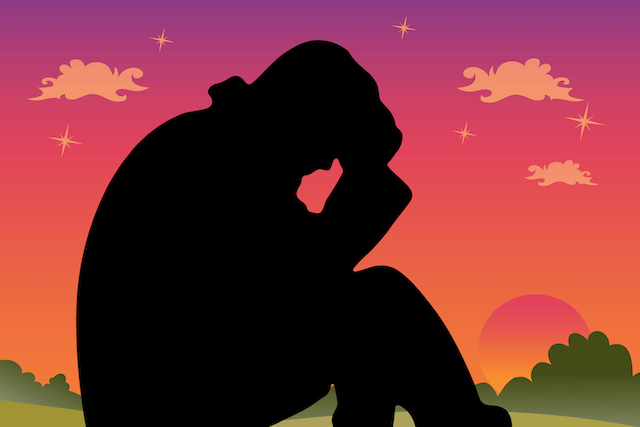
“As rain falls equally on the just and the unjust, do not burden your heart with judgments but rain your kindness equally on all.” ~Buddha
Our burdens come in many forms. They are our relationships, our responsibilities, and our pasts that haunt us from beneath our consciousness. They weigh us down and prevent us from experiencing life’s true joy.
Some people have to care for a sick family member most of their life. Some women give birth to stillborn babies. Some soldiers get their legs blown off while deployed.
My story is unextraordinary: I’m a white, middle-class woman. My life has been easy, and I have no reason or right in this world to feel emotionally oppressed. And yet, for all my life, I’ve felt I was a burden to those around me.
It all started, as many stories have, with my parents.
My mother always told me about how she had to purchase books on strong willed children because I was “too much” as a toddler, and she didn’t know how to handle me.
Both of my parents pushed me to be independent: do it on my own, regardless of whether I was ready. Often, I was. But on the occasion I wasn’t, I wanted to be a good daughter, so I tried and tried until I could do it independently anyway.
They praised my independence. I also watched them dole out criticism to anyone who relied on others or let others take advantage of them.
Because I love my parents fiercely, I took this to heart and vowed never to be a burden to them.
I have spent most of my life fighting to control how others viewed me so that I could assure them that I was not going to be a burden.
When I was a young adult, a few years out of college, I was forced out of my first (beloved) teaching job. I had nowhere to go and was waiting to hear back from the graduate programs I had applied to.
Although I never asked them to move back in, my parents told me, “Well, you better not think you’re moving back in with us, because that’s not happening.”
After picking up the pieces of my broken self, I set off for grad school with my then-husband in tow.
I married my first husband at twenty-four, mistaking pain for love. He was profoundly troubled—touched by depression, anxiety, and deep-seeded self-loathing, and I was going to save him. I was going to be the force that moved him from “burden” to “power.”
We fought and struggled and suffered, and as you probably guessed, I did no saving of any kind. I did, however, endure relentless emotional and verbal abuse for years. I wish I could say that our toxic relationship was fully his fault, but unfortunately that’s not the way things work.
After years of poor emotional regulation skills and believing everything in life is a burden, I treated him like one, too. Communication is a two-way street, and I was an excellent emotional manipulator. After completing grad school and our third year of marriage, I finally acknowledged that our relationship was built on pain, and I divorced him.
I got a new job and moved to a new state, away from my failed marriage and away from my parents. I met a man who made me feel, for the first time in my life, like I wasn’t a burden.
As Thich Nhat Hanh said, “You must love in such a way that the person you love feels free.”
To this day, my husband makes me feel light and free. He sits with all of my emotions, my good ones and my bad ones. He takes my poor communication and bad emotional self-regulation skills in stride and gently calls me out when I make him feel like he is a burden.
My husband has taught me what it means to love unconditionally and give support without the expectation of anything in return. And he has taught me how to give unconditional love as well.
Over the years I’ve become progressively better at acknowledging my feelings about being a burden to others and how others can be a burden to me.
A couple years ago, my mother turned her criticism to one of her best friends who gives money to her adult daughters by paying some of their bills. My feelings of being a burden burned in my heart as my mom raged for over a half an hour about how her friend was wrong to give them money because her daughters would never know how to stand on their own two feet.
I bit my tongue. Telling her to stop raining judgment on others would only make me a burden on her.
But it was at that moment that I experienced a turning point. I realized that avoiding becoming a burden to people was becoming a burden to me!
It’s like the adage, “Don’t be too busy worrying about whether they like you that you don’t even consider whether you like them.”
The very thing I was avoiding in my life had become the heaviest burden that I was carrying with me, day in and day out.
Last summer, I watched my dad—after finding his eighty-nine-year-old mother passed away one morning—fail to acknowledge any emotions or grief. Instead, he complained about having to cancel her cable, hire painters for her condo, and the burden of being her executor. And then he commented how much time my mother spends taking care of her ninety-seven-year-old mother.
He said how much time they’ll have when my maternal grandmother passes away. How much time they’ll have when my brother’s children are in school, and they don’t have to babysit. How much time they’ll have when my mother can retire and doesn’t have the burden of having to work… the list goes on.
I will not wish away someone else’s life or my time to make my own life a little easier. I will not spend my life waiting for all my burdens to disappear, only to learn that all the joy is gone and there is nothing left.
The opposite of joy is not pain: it’s numbness.
If you take away the pains, the joys will be gone too, and you’ll be left feeling empty.
You cannot remove yourself from being someone else’s burdens (that’s on them). You can’t even remove all your own burdens. But you can move through your burdens and transcend your pain to find more joy in life.
If you feel you’re a burden on others, understand that every person on this earth deserves connection and support, including you. Needing and asking for help doesn’t make you a burden, and if someone implied this to you or even said it directly, they were wrong.
If you’re feeling hopeless that people exist who love without any expectations, take heart: they are out there. And when you find them, learn from them how to give unconditional love, and give them that in return. You don’t have to go through life alone.
If you’re waiting on a time that you will never have any burdens, remember that you can choose where your focus is. It’s easy to ruminate on our burdens and pains. When you find yourself obsessing over what’s weighing you down, gently release the thoughts.
Find things in your life to build upon joy: relationships, creative practices, or hobbies. These are great ways to interrupt the pain and make you feel lighter.
And remember that judgments are burdens. Before you judge others, ask yourself what kinds of burdens they might be carrying. You can’t get rid of their burdens for them, but you can help them carry them, simply by being there and listening.
Rain will fall on your life. We all have burdens and feel like we’re the burden from time to time. But if you can shift your perspective, you can stop your burdens from weighing you down and you can experience all the joy life has to offer. And if you’re lucky, you can rain your joy and kindness on others, too.
About Dawn Perez
Dawn Perez is a former music teacher turned blogger. Her family consists of her husband and two sons. She is passionate about the wonder of learning, sharing life with others, rock climbing, and picture books. You can find more from Dawn at wildsimplejoy.com. (For more about feeling like a burden, check out “I Feel Like a Burden”—4 Ways to Reframe Your Feelings Positively.)













 Though I run this site, it is not mine. It's ours. It's not about me. It's about us. Your stories and your wisdom are just as meaningful as mine.
Though I run this site, it is not mine. It's ours. It's not about me. It's about us. Your stories and your wisdom are just as meaningful as mine. 